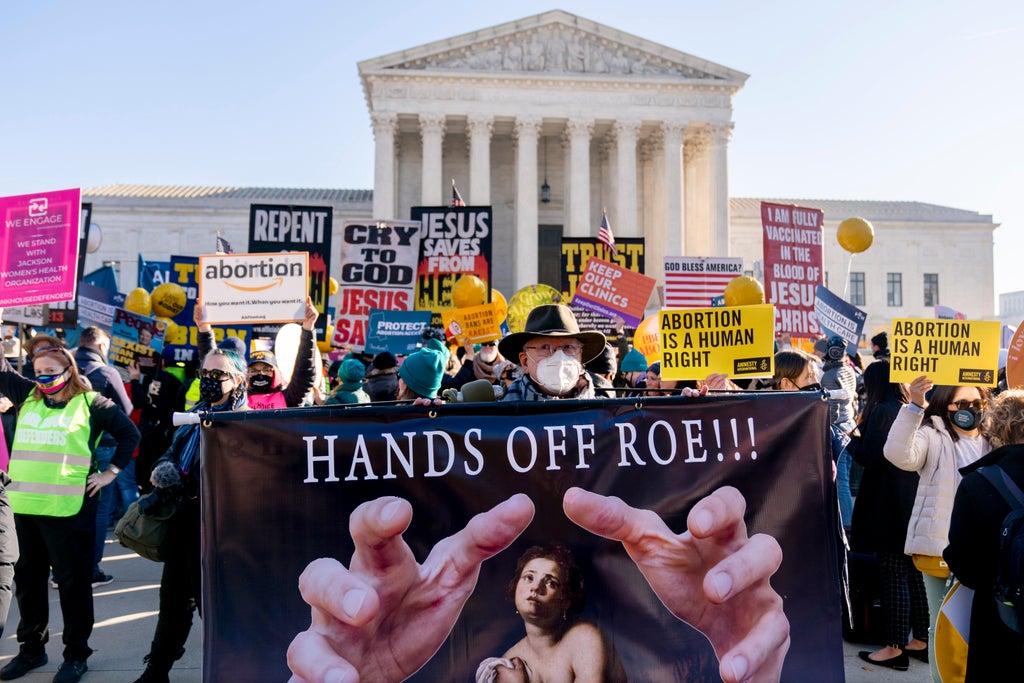
Idaho’s state legislators have passed a measure to ban abortions after only six weeks or pregnancy and to allow private citizens to sue healthcare providers, legislation that abortion rights advocates have condemned as a dangerous “copycat” of draconian measures in Texas.
On 14 March, the state’s House of Representatives approved Senate Bill 1309, largely modelled after a Texas law that bans most abortions in the state. The vote was 51-14. The legislation heads to the desk of Republican Governor Brad Little, who signed a similar bill into law last year.
Idaho’s bill – the first in the nation to mirror the restrictive Texas law – also allows family members of what the legislation calls “a preborn child” to pursue legal action against providers, with a reward of at least $20,000 plus legal fees, in lawsuits that can be filed up to four years after an abortion.
“It is appalling that anyone could look at the chaos and harm in Texas over the past six months and think, ‘I want that for the people in my state,’” Planned Parenthood Action Fund president Alexis McGill Johnson said in a statement.
The measure will “inflict harm on pregnant people in Idaho if it is allowed to go into effect, and it will disproportionately impact our already underserved communities,” she said.
“Physicians and medical providers around the world live by a simple principle: ‘First, do no harm.’ Sadly, Idaho politicians have not taken a similar oath, and are determined to ban abortion, no matter the harm it would inflict on their constituents,” said Jennifer M Allen, CEO of Planned Parenthood Alliance Advocates.
She called the bill a “travesty grounded in bad motives, questionable legality, and no science at all.”
Idaho’s chief deputy attorney general already has suggested that the measure is unconstitutional and vulnerable to legal challenges.
Signalling a possible legal challenge, the ACLU of Idaho warned last month that the measure “encourages everyday Idahoans to act as vigilantes, allowing anyone to surveil the lives of pregnant people [and] giving the ability to sue medical professionals who provide a safe abortion.”
But Republican officials across the US, emboldened by the US Supreme Court’s anticipated ruling in a case that could determine the fate of healthcare protections for women, have filed dozens of bills or have approved laws in place that could immediately or quickly ban abortion in more than 20 states if the decades-old precedent in Roe v Wade is overturned.
The precedent set in the landmark 1973 decision in Roe v Wade prohibits states from banning abortion before a foetus is considered viable outside the womb, which medical professionals determine is roughly 23 weeks of pregnancy.
Following December’s opening arguments in a Mississippi case involving a state law that bans the procedure after 15 weeks, the court’s six conservative justices signalled readiness to uphold the law, marking the biggest direct challenge to the constitutional right to such medical care.
Should the court overturn precedent, Idaho and several other states already have in place a so-called “trigger ban” which would immediately outlaw all abortions in the state.
The nation’s high court also has declined to intervene to stop the Texas law, which allows any civilian to sue anyone who “aids or abets” an abortion, with $10,000 plus legal fees for successful suits.
Idaho’s House legislators passed the state’s measure the same day they also killed a bill to allow women to get six months of prescription birth control at one time.
“If you think abortion opponents will stop at abortion think again,” said Elizabeth Nash with reproductive health justice organisation Guttamacher Institute.







